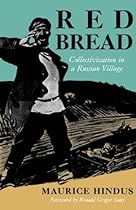Red Bread: Collectivization in a Russian Village (Midland Book)

| Author | : | |
| Rating | : | 4.53 (704 Votes) |
| Asin | : | 0253204852 |
| Format Type | : | paperback |
| Number of Pages | : | 396 Pages |
| Publish Date | : | 2014-05-03 |
| Language | : | English |
DESCRIPTION:
Maurice Hindus (1891-1969) emigrated to America in 1905. His many books include The Making of the Georgian Nation (IUP, 1994).. As a writer, lecturer, and war correspondent, he made many trips to Russia during the 1920’s, thirties, and forties. Among his best-known books about Russia are Broken Earth and Humanity Uprooted.Ronald Grigor Suny is Charles Tilly Collegiate Professor of Social and Political History at the University of Michigan
Red Bread contributes an invaluable grassroots perspective on the era's dynamism and despair to the current discussion of the Soviet historical experience in the Soviet Union and the West.. Convinced that collectivized farming would bring Russian agriculture and the Russian peasant into the modern age, Hindus was nonetheless deeply troubled by the huge social cost and personal suffering inflicted by Stalin’s ruthless campaign. First published in 1931 and long out of print, Red Bread is Russian-born journalist Maurice Hindus’s account of his return to his native village in 1929-30 to see for himself how Stalin's collectivization campaign was transforming the lives of the peasants among whom he had grown up in prerevolutionary times. This warm and human narrative conveys in personal and immediate terms his peasant neighbors' responses to being forced out of a centuries-old way of life and into the unfamiliar social setting and industrialized large-scale agriculture of the kolkhoz
A very interesting and informative book. Karkenn@spec.net This book was required reading for my History of Russia- The Stalin Years class. As I began to read this book, I began to feel for the people and all the pain and terror that they were experiencing. This book shows the true horror of the time and reminds us that this is a time that we never wish to be part of or experience ever again.
"Hindus takes the reader into the turmoil of the 1930s during collectivization. In this honest, passionate account one feels the texture of Soviet life, the actual process of social upheaval of that time." Ronald Grigor Suny"Here we have the mud and the rank smell of mahorka; sour cream, flies, and greasy sheep-skin coats; the perfume of waving rye and buckwheat; the reek of unventilated muzhik huts and peasant whining and clamorin short, the real rural Russia." The Saturday Review of Literature, 1931
